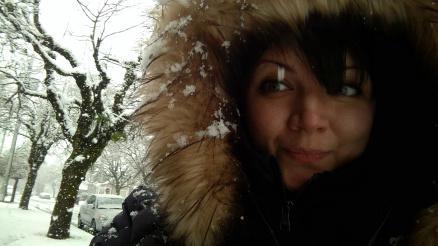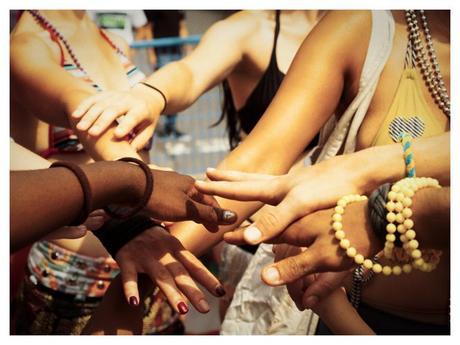One can choose to go back toward safety or forward toward growth. Growth must be chosen again and again; fear must be overcome again and again.
Abraham Maslow
We all have a need for consistency and community. What Abraham Maslow classified as ‘belongingness’ is one of our biggest sources of security. And, while many individuals find this most commonly through partnership on the Relationship Escalator, Solo Polyamorists- who eschew the escalator model- look to their greater community and chosen family in order to meet that need for security and safety.
 A big part of my journey in Solo Polyamory has been in seeking out that community and looking for ways to meet that need outside of an escalator relationship. The plural nature of polyamory lends itself well to this- at first glance, at least- with all the interconnected relations and interweaving of people. I, like many, have found myself at times falling into that old trope of “You’re poly, I’m poly, we have so much in common!” We don’t always choose the best family.
A big part of my journey in Solo Polyamory has been in seeking out that community and looking for ways to meet that need outside of an escalator relationship. The plural nature of polyamory lends itself well to this- at first glance, at least- with all the interconnected relations and interweaving of people. I, like many, have found myself at times falling into that old trope of “You’re poly, I’m poly, we have so much in common!” We don’t always choose the best family.
Just as one uses discernment — or not — when seeking out romantic, intimate, and sexual relationships, it would seem to make sense to also use that same discernment to choose carefully the community one engages with, right? However, as the saying goes, common sense is hardly common. Survival instincts can sometimes override common sense, and it is possible to settle with a close fit where the places of misalignment seem they can be tolerable.
There is most definitely a risk of falling into old patterns of habits and behaviors when choosing community.
Five years into it, and I reflect on how so much of my journey in Solo Polyamory has been about reclaiming a sense of independent identity. I grew up with mixed levels of security, and- for all my independent spirit- I struggled to find security as a young adult without a partnership. The conscious choice to do polyamory without a primary relationship was, in part, me challenging myself to step out of codependency habits and into an experience of interdependence.
I discovered that the long ingrained patterns of codependency still occasionally showed up within the survival-driven community-building I’ve endeavored to engage in. More recently I have found an ever clearer line between the relationships that feel nourishing and energizing, and the relationships which feel draining and depleting.
 This year so far has seen me diving into deep introspection around this. The cocooning winter hibernation has provided the perfect space for grounding into a deeper understanding of my self and what I need. I am someone who hasn’t experienced much security in my adult life, and many relationships- both romantic and social- have been ones that I’ve engaged in in part as a survival strategy, to build networks wherein I might find a safety net. And when I’ve found a dynamic that feels good, I’ve leaned in heavily, perhaps too much at times, in search of that security I crave.
This year so far has seen me diving into deep introspection around this. The cocooning winter hibernation has provided the perfect space for grounding into a deeper understanding of my self and what I need. I am someone who hasn’t experienced much security in my adult life, and many relationships- both romantic and social- have been ones that I’ve engaged in in part as a survival strategy, to build networks wherein I might find a safety net. And when I’ve found a dynamic that feels good, I’ve leaned in heavily, perhaps too much at times, in search of that security I crave.
But I have yet to really achieve that reliable safety net. So far what I’ve done hasn’t been working for me.
I found it’s easy to fall into a trap of spending all one’s time trying to please others, out of a fear of potentially losing them if you don’t please them. But that’s putting the community before the individual, and when that happens, your individual health suffers.
When you put your self aside in order to please others, you aren’t honoring your individual needs and desires; you’re surrendering autonomy to the whims of others- and replacing an old co-dependency on one with a new co-dependency on many. And, it’s possible to go from reforming self identity to fit one partner’s expectations, to trying to fit a community’s expectation.
That can be healthy and empowering if the community is one formed of individuals who are engaging in self awareness and growth and celebrate diversity of individuality. It can be potent and liberating if the community embraces consent, compassion, empathy and forgiveness. However, if a community is mired in draining, limiting, fear-based behaviors, if the community lacks cohesiveness in shared values or tolerates abusive behaviors, it may end up generating new self-identities that limit self expression and freedom. It’s easy to feel small in that. And when people allow themselves to be small in their own lives, that’s when they might experience depression, anxiety, and suicidal thoughts.
And yes, I speak from my own experience here.
When people appear to be something other than good and decent, it is only because they are reacting to stress, pain, or the deprivation of basic human needs such as security, love, and self-esteem.
Abraham Maslow
So what do we solo polyamorists do?
For us who are polyamorous and queer, our family may not be a source of security. For many of us who are solo, we don’t necessarily experience our romantic and sexual relationships as the most grounded source of connection in our lives; the communities we choose are often fluid and changeable themselves.
My recent experiences have led me to believe it is paramount to figure out the compatibility between one’s self, and a community of friendship- whether that is entangled with one’s polycule, or not. Do your core values align? How do you deal with conflict? And- to what degree are people able to be independent in their relationships?
I’m examining this in many areas of relating in my life. It’s important to note that I’m not deeming a person (or group) to be toxic, but rather, the dynamic that exists between people- which they both participate in- that can be draining. ‘Toxicity’, while being an evocative and charged description I sometimes lean on, is really a judgment and story about a feeling, one which often comes with finger pointing and blame.
When we use the word toxic to describe how we feel about something, we judge that feeling. Instead, consider that any number of people (including yourself) can play into a relationship becoming toxic. What’s more, there’s the possibility that a dynamic can change when the people in the relationship changes their behavior; very nourishing connections can become draining, and likewise draining connections can once again become nourishing.
“The longer you are in an echo chamber the shittier your coping skills become.” ~ Paul Verge
So what do we do? In the echo-chambers of sub-culture communities, how can you tell the difference between the draining, ‘toxic’ dynamics, and the ones that are nourishing? Here’s my checklist for evaluating a relationship dynamic, be it with a person, or a community:
 Signs this relationship dynamic might currently be Draining for me:
Signs this relationship dynamic might currently be Draining for me:
- I make a lot of excuses for this person’s behavior.
- I experience feeling exhausted/drained/tired/lethargic in their company or after spending time with them.
- I perceive that I seem to be doing a lot of the emotional heavy lifting in this relationship.
- I don’t feel that this person appreciates what I do.
- This person seems to have a lot of ‘drama’ in them and around them.
- I’m afraid to confront this person because of their possible reaction (but I’m not afraid of confrontation in general).I feel really lost and abandoned if this person isn’t communicating with me.
- Communication with this person seems to be very one way.
- Communication with this person seems to be limited in topic range.
- I don’t feel I can be totally myself with this person, I need to pretend some things about me are different, or hide some aspect of myself.
- I feel like the ideas this person holds onto are stuck in an echo chamber, and they resist considering alternative perspectives.
- I feel like I need to make myself ‘small’ in order to please this person, or at least, not anger them.
Signs this relationship dynamic is currently Energising for me:
- I have no fear in talking to or approaching this person.
- We make our way through difficult conversations without escalating conflict between us.
- I feel heard and appreciated by this person.
- I experience two way communication with this person.
- I am excited for this person to meet other friends, and for friends to meet them.
- I feel energised, refreshed, possibly inspired, after my interactions with this person.
- We are able to mutually hold emotional space for one another.
- We talk about and explore many different topics together.
- I don’t feel a need to hide any part of myself, I can be totally authentic.
- I feel like I can present alternative ideas and perspectives to this person without being shut down or shut out.
- I feel very empowered by this dynamic, and I notice the other person also feels this way.
I read something recently about being in an abusive relationship. One of the questions posed was, “Do you find yourself making excuses for, or justifying, your partner’s harmful behaviour?” I look at this question in the framing of my relationships, and I can see how, in about half of the most compelling relationships I have been in, I’ve taken steps to defend or justify a partner’s hurtful behavior towards others. This pulls me into some serious self-examination around why I feel the need to defend hurtful behaviour- and what boundaries do I need to consider in future relationships whereby I won’t find myself doing so again?
So, what do you do when you realize a dynamic is no longer fulfilling? There’s many things. Here’s a few that have been working for me:
Strategies for Shifting from Draining To Energising:
- Check in with your core needs and desires– are they being met, and if not, what could you do to refocus on them?
- Create boundaries that are loving and compassionate, that nourish your needs and create spaces where you feel energised.
- Take a time out from the dynamic to allow for recalibration.
- Examine what your core values are, and consider how you could bring them to life in your day-to-day world more.
- Diversify your social circle.
- Spend time doing things you love and invite people in your life to join you doing them.
No matter how great the sex is (or has been), no relationship is worth tolerating a draining, unfullfilling dynamic in the emotional, social, and spiritual aspects of the relationship- and my inner good girl has defended one too many people who ended up doing me more harm than good.
I’ve learned that the longer we tolerate relationships that don’t feed and inspire our spirits and hearts, the more weighed down we feel. Solo polyamorists need their communities as a core element of security, stability and anchoring in their lives- not just as an emergency survival strategy, but as a long term relationship- and we each deserve to find communities of friends and lovers who will respect our independent spirits, and hold us steady through the rough times.
For me, I’m on my way. I’m excited for 2017 becoming the year where I redefine how I relate to the communities I’ve participated in, and choose to engage with. I’m stoked for the new boundaries I’m creating that make space for me to show up fully. The biggest piece: I realised I can’t keep playing small in order to make others feel better: I’m here to love in big ways, and invite everyone to join me in being big and bold in the ways they love. And perhaps, if we can all love in big and bold ways, we’ll grow a community with much deeper roots, stronger foundations, and dynamics that enrich and enliven us all.


